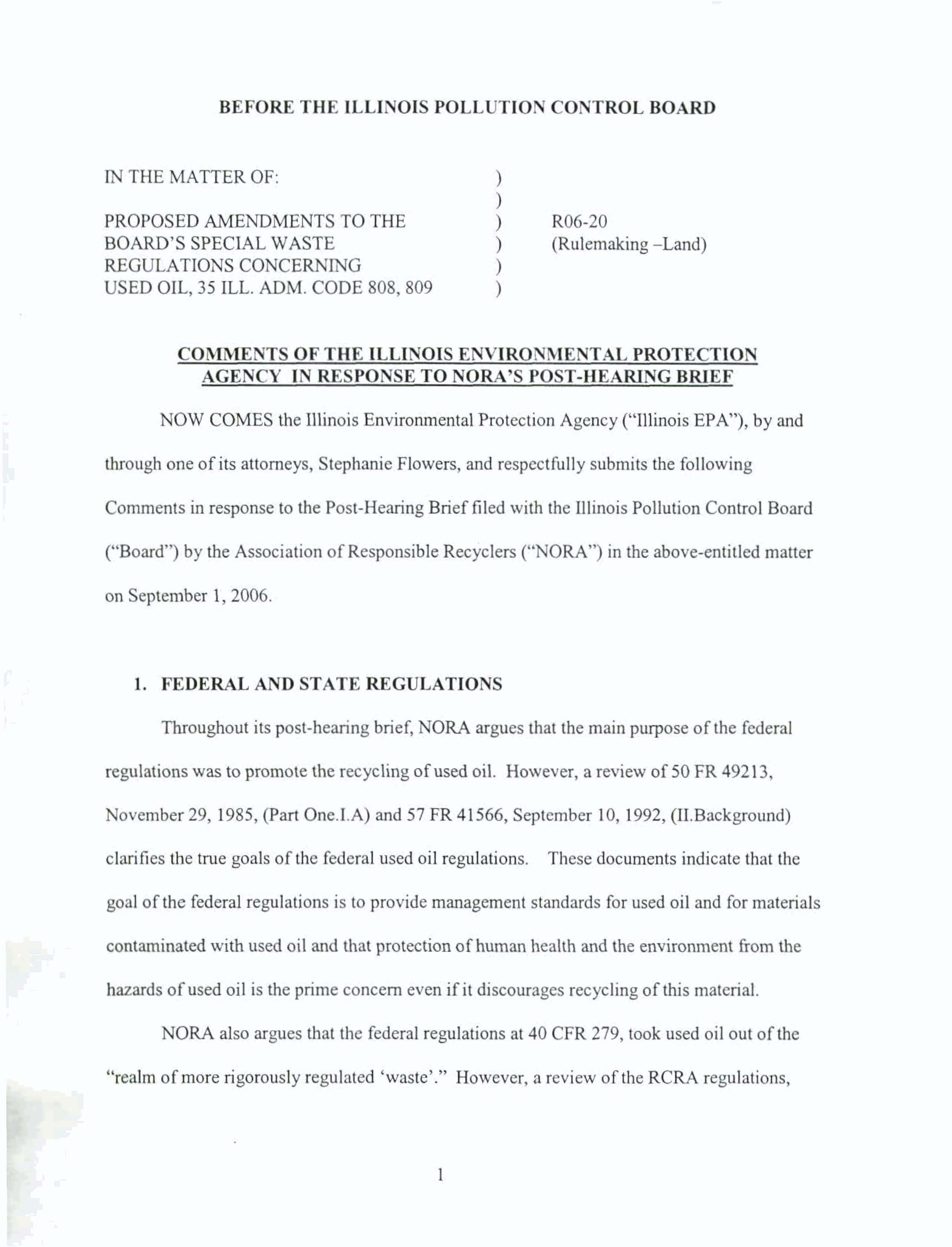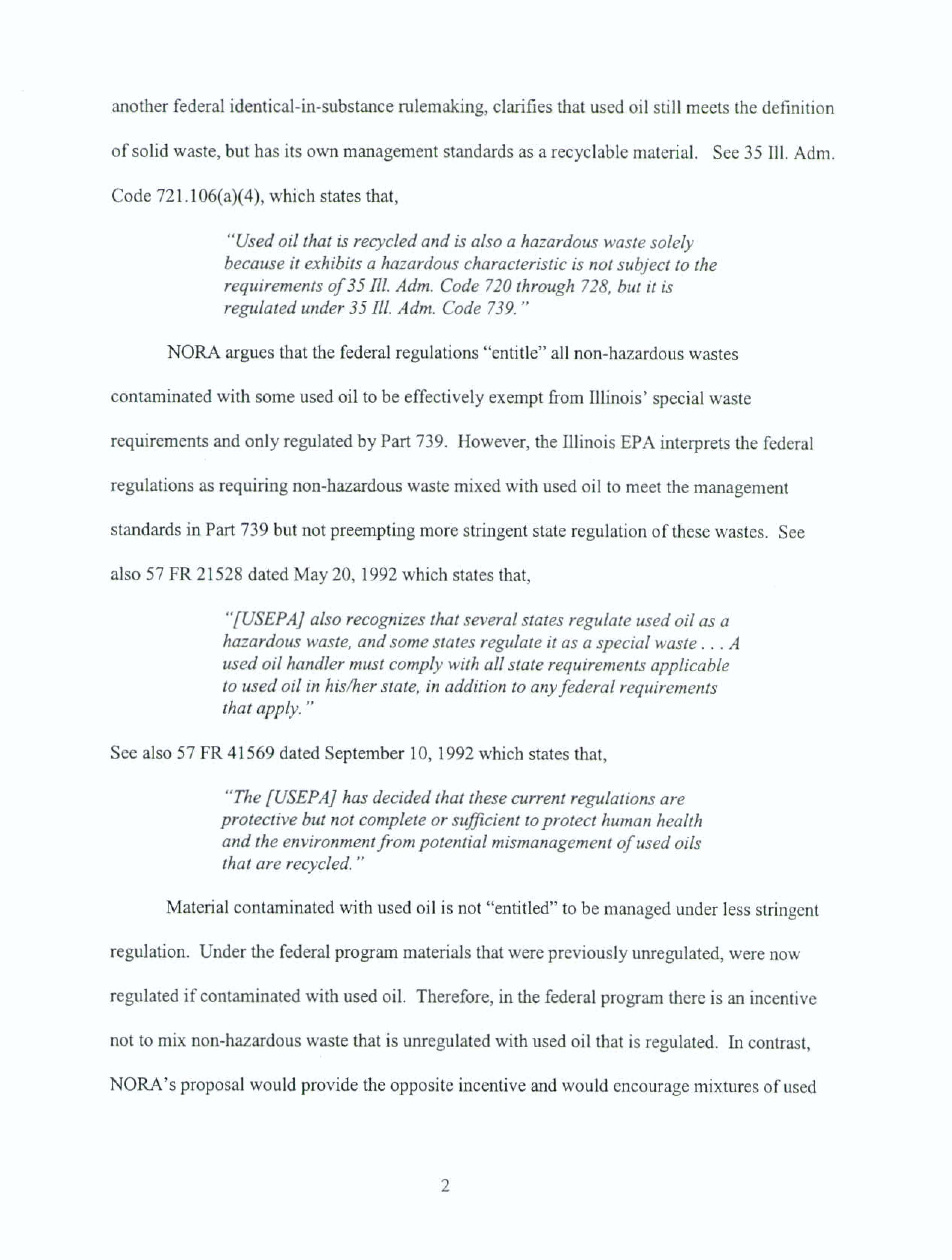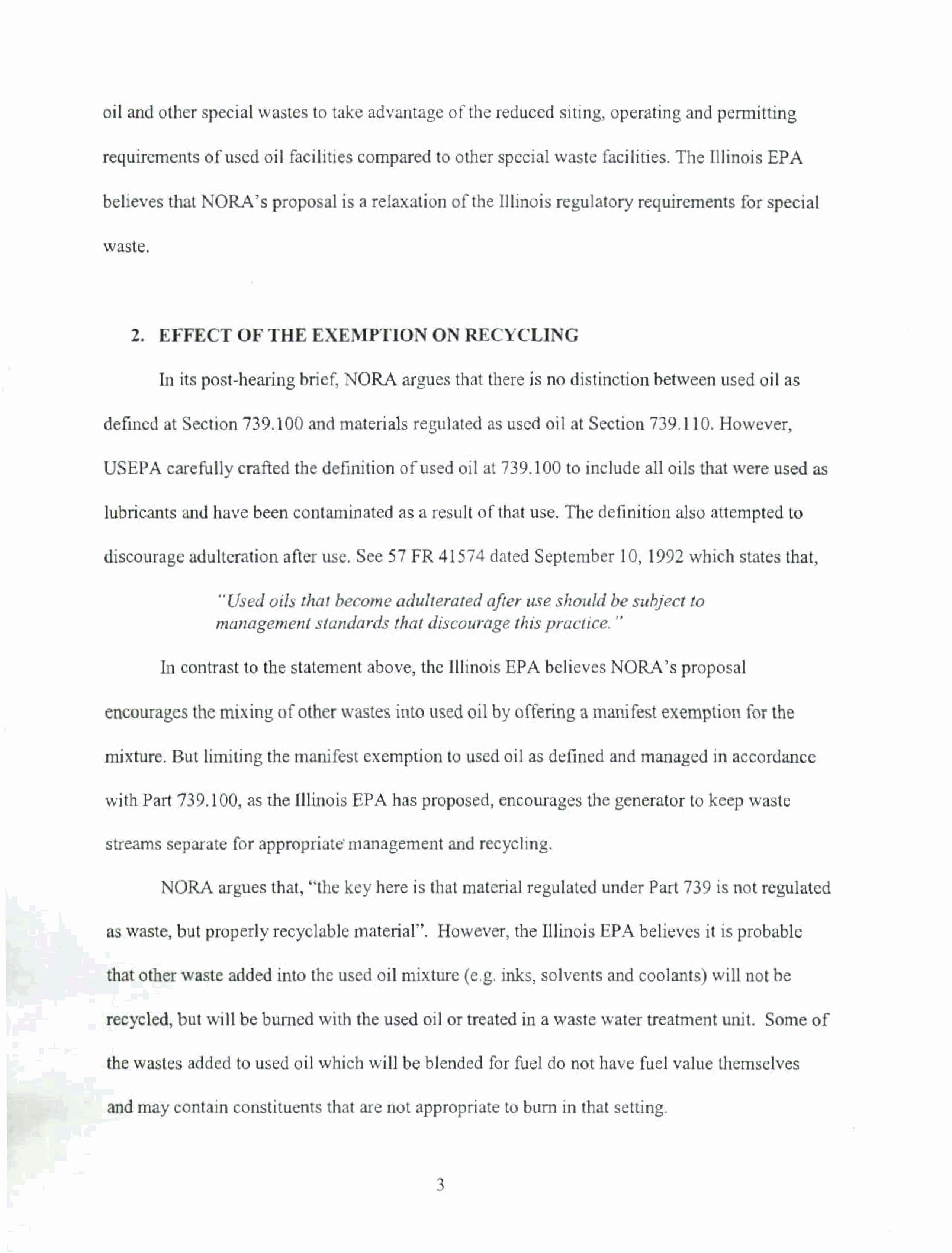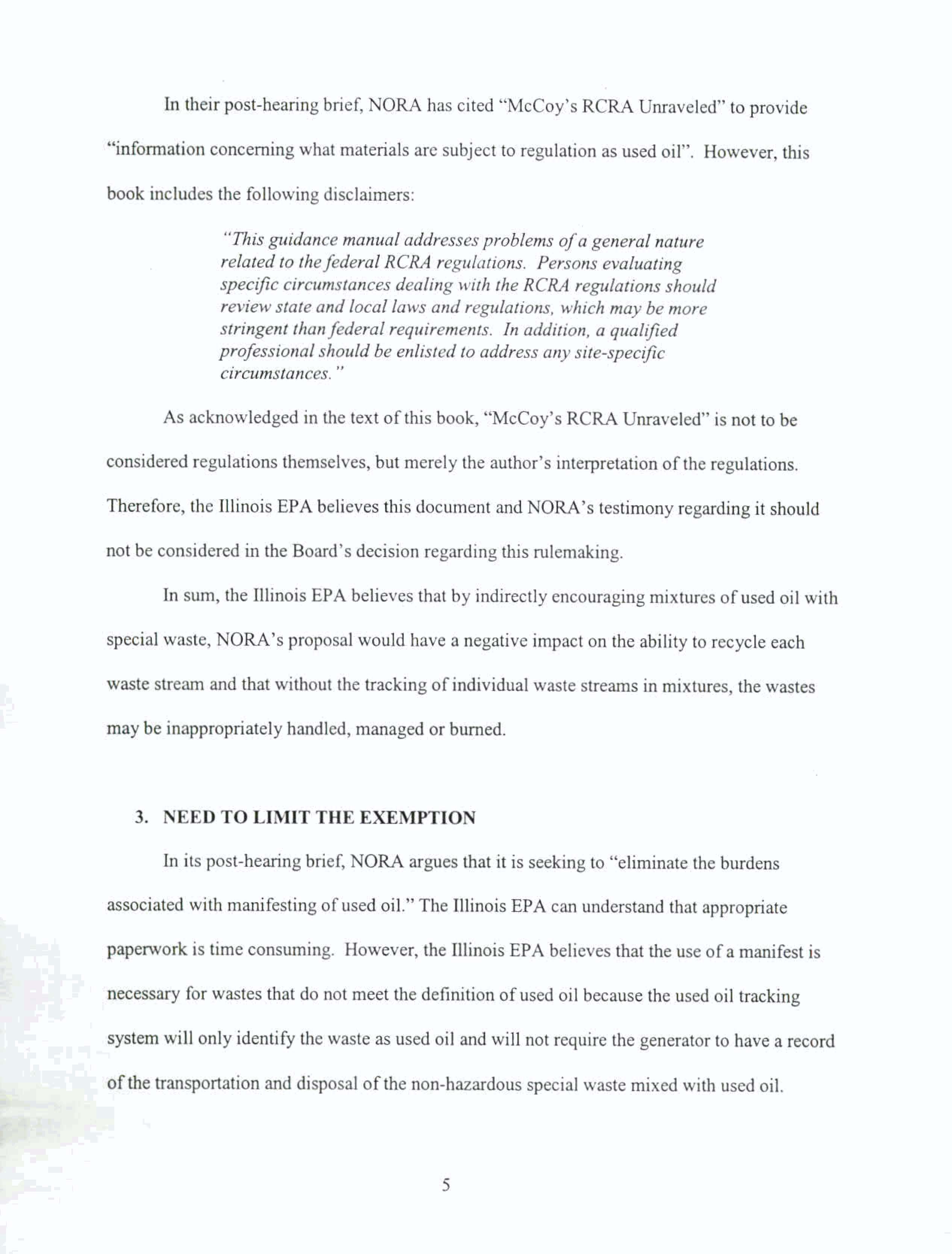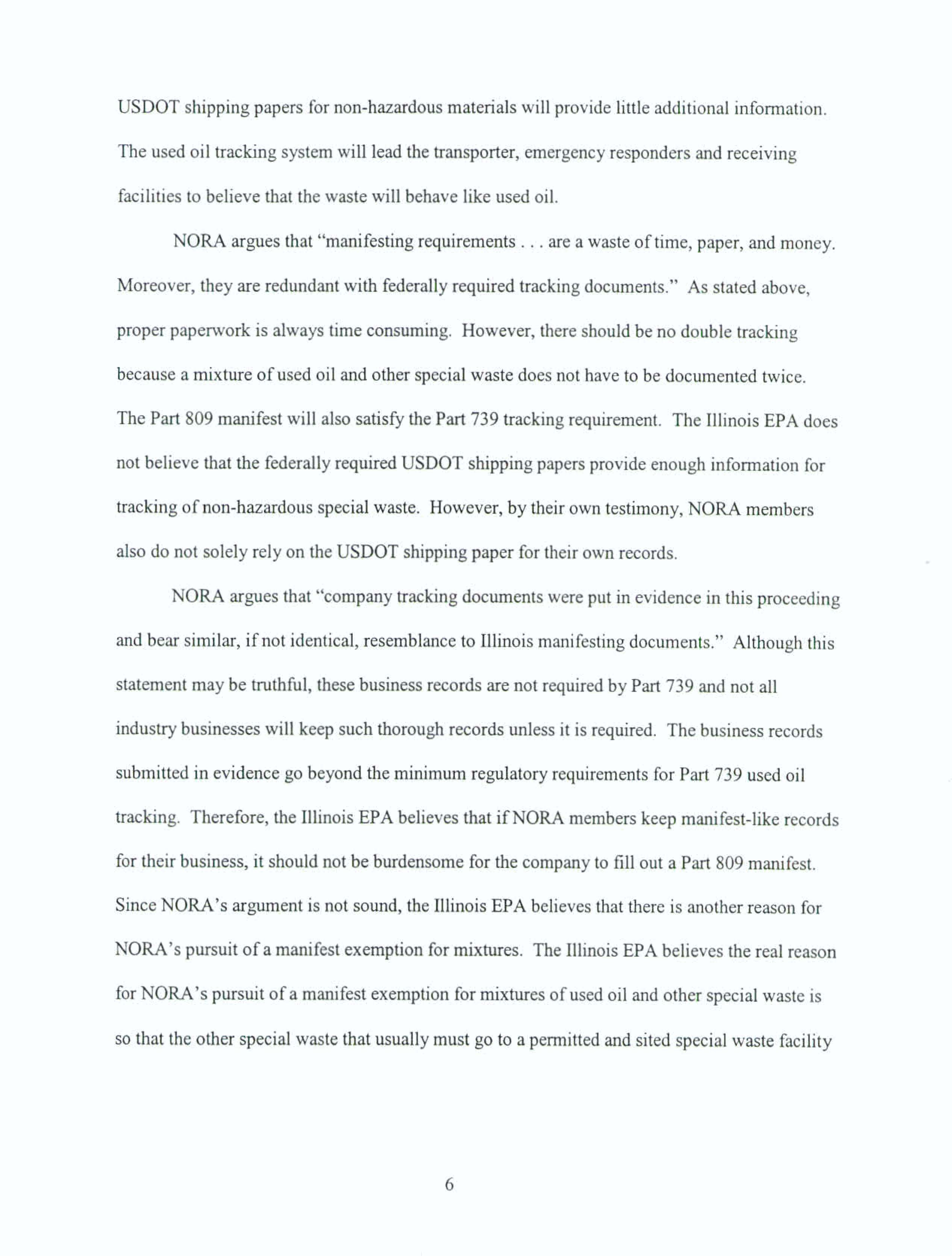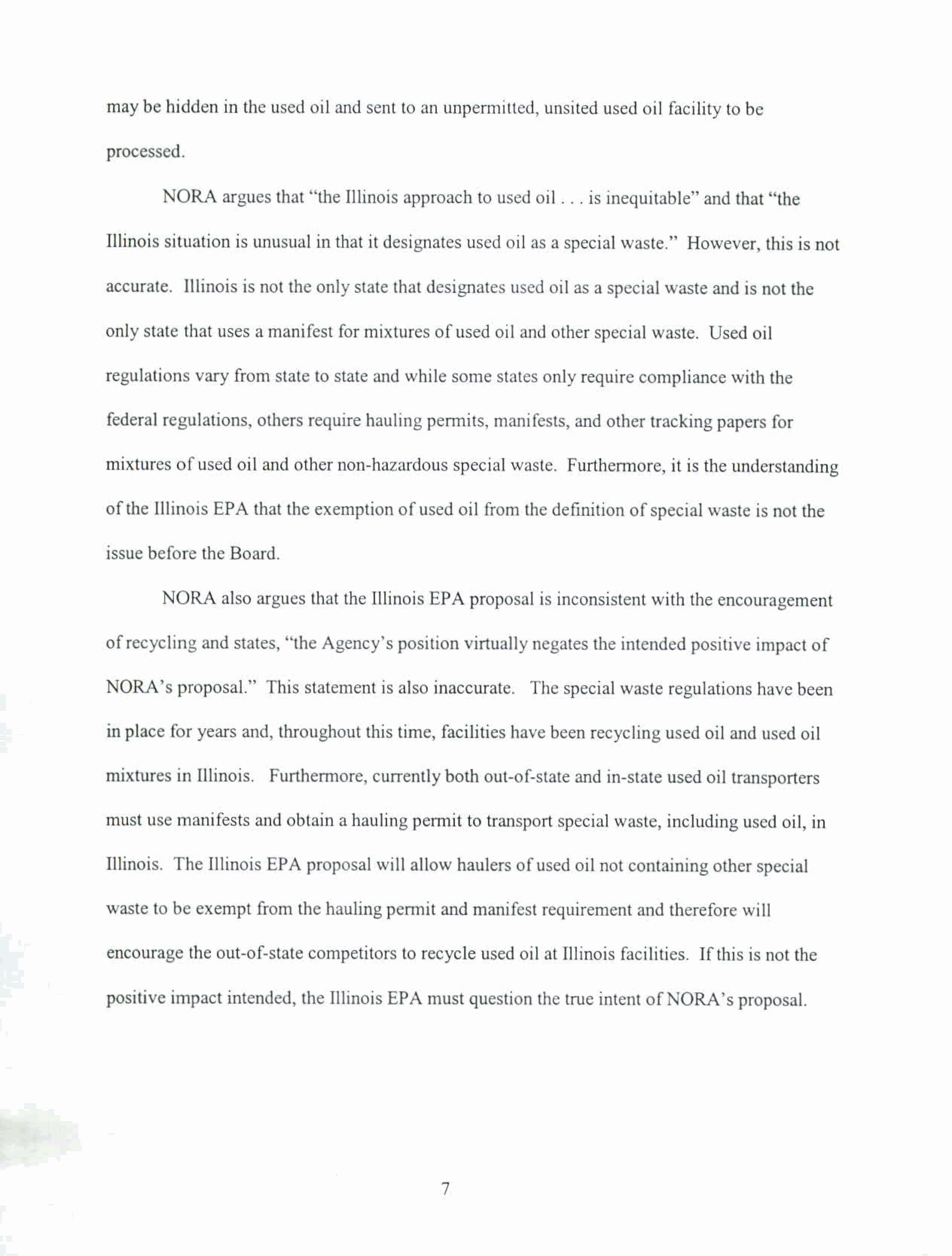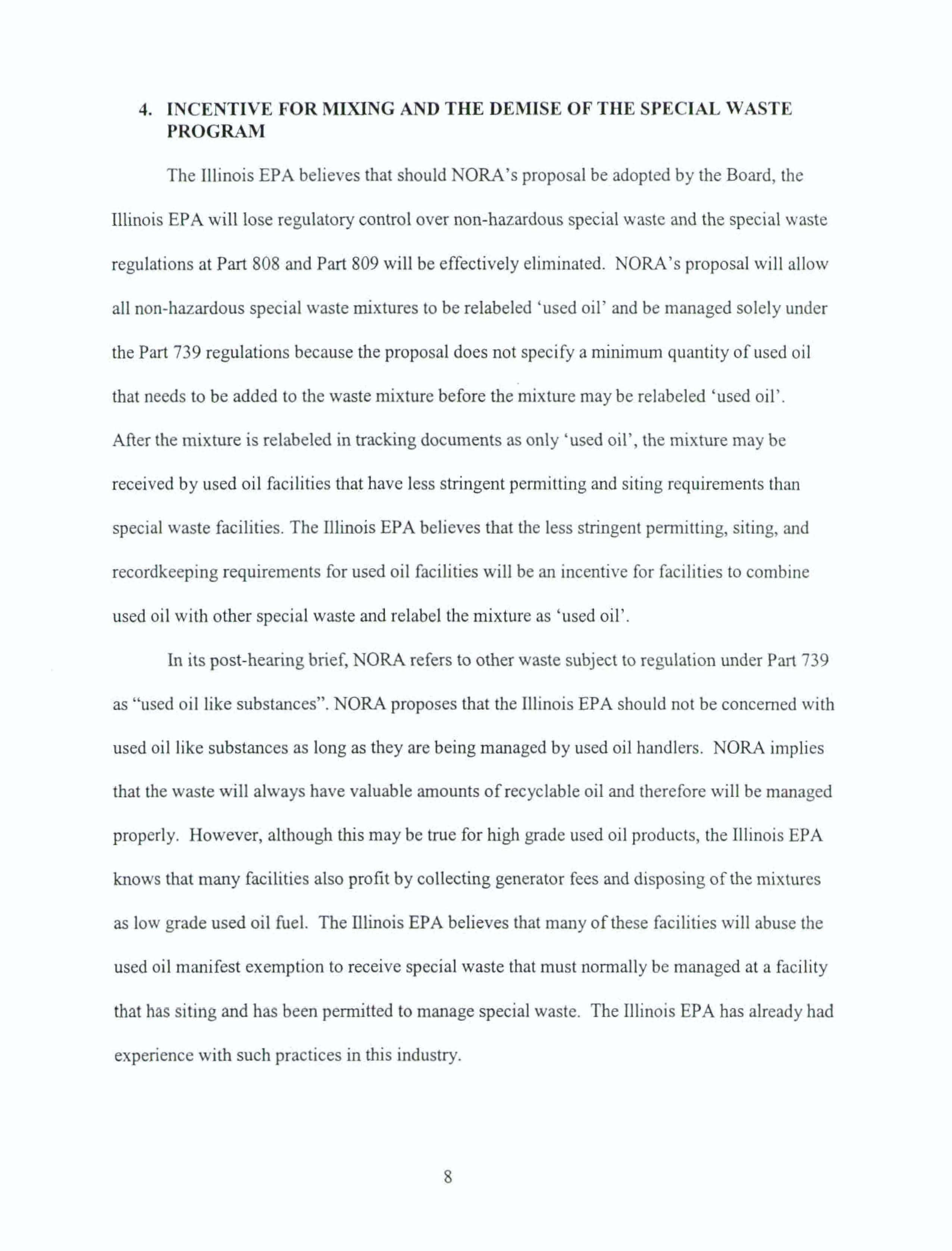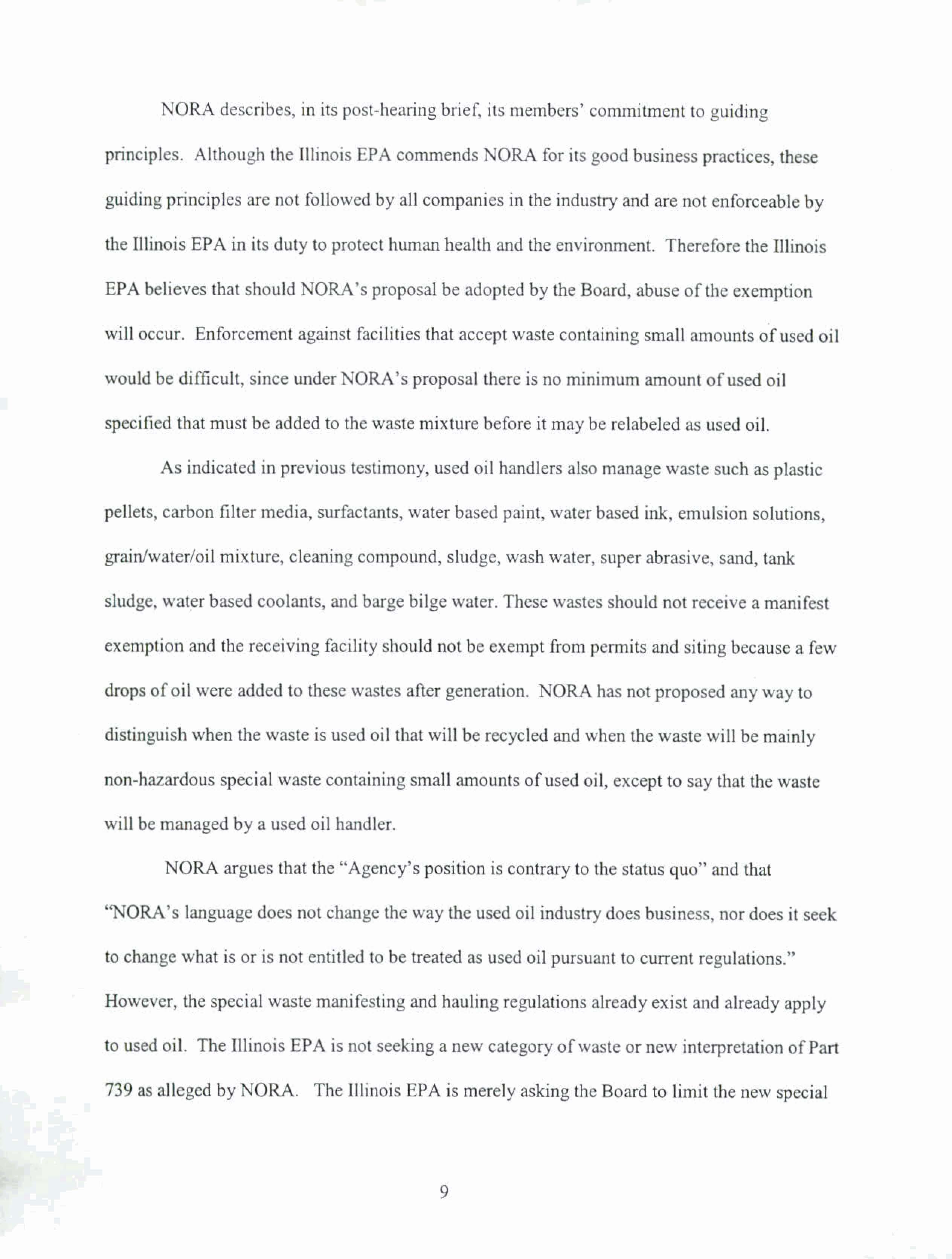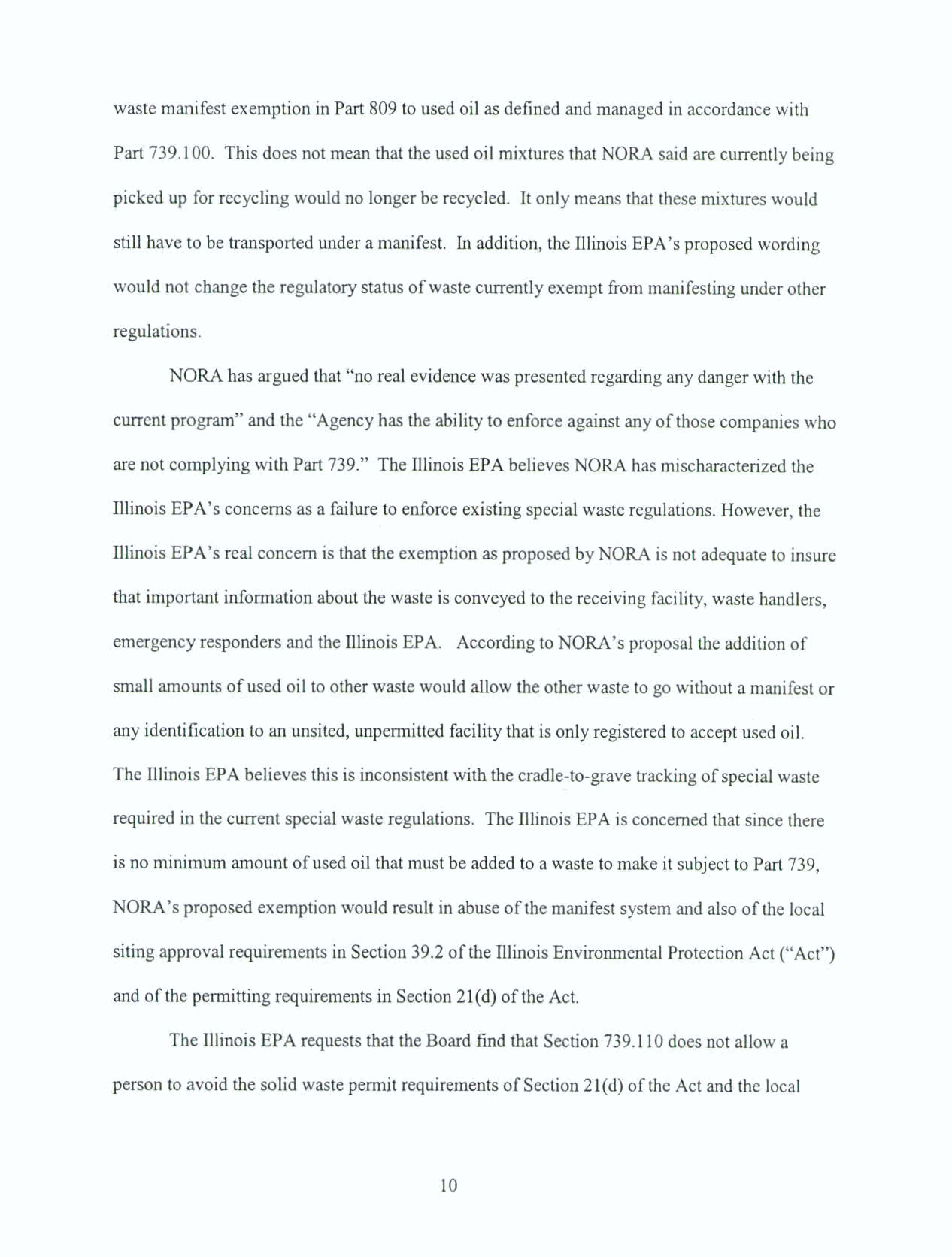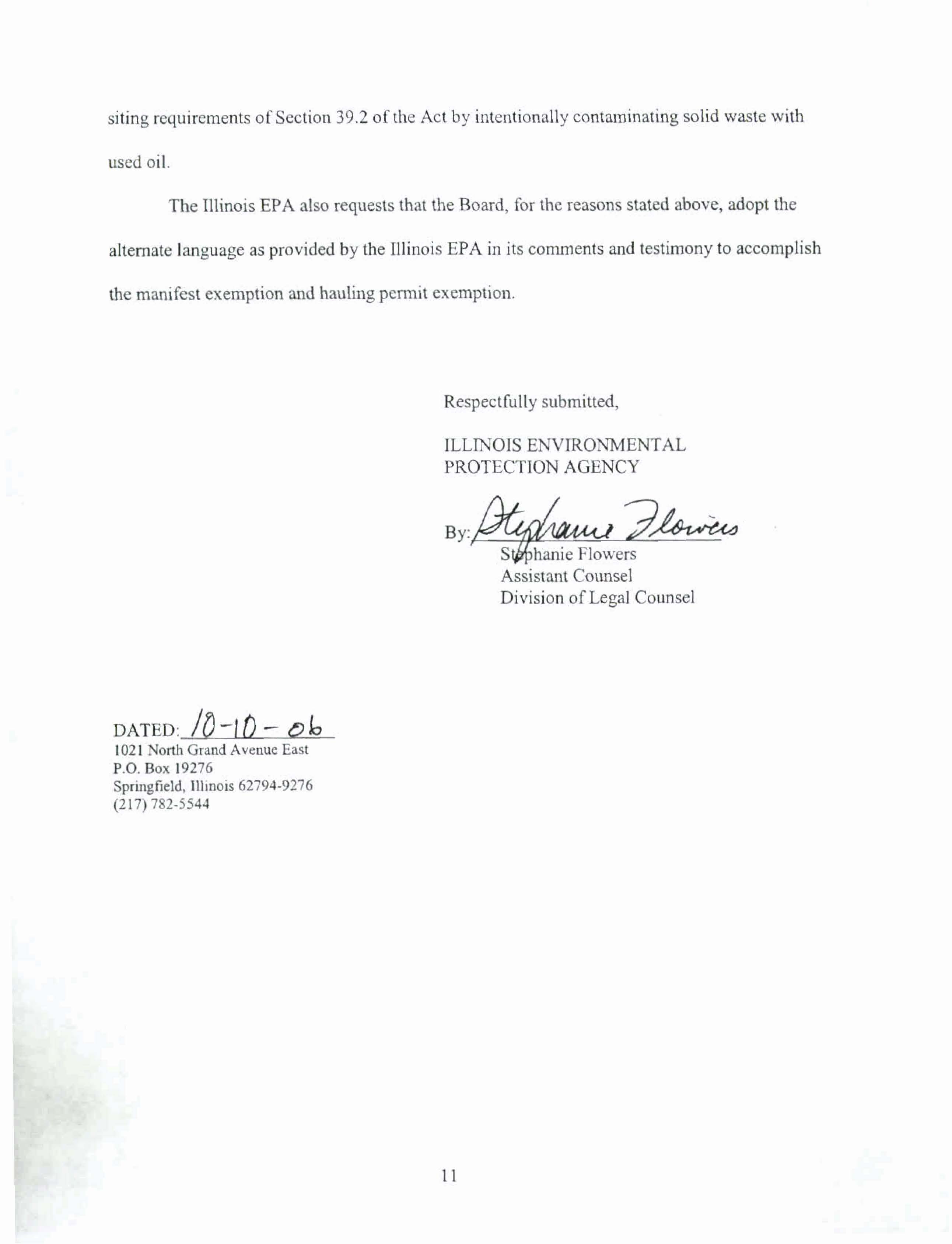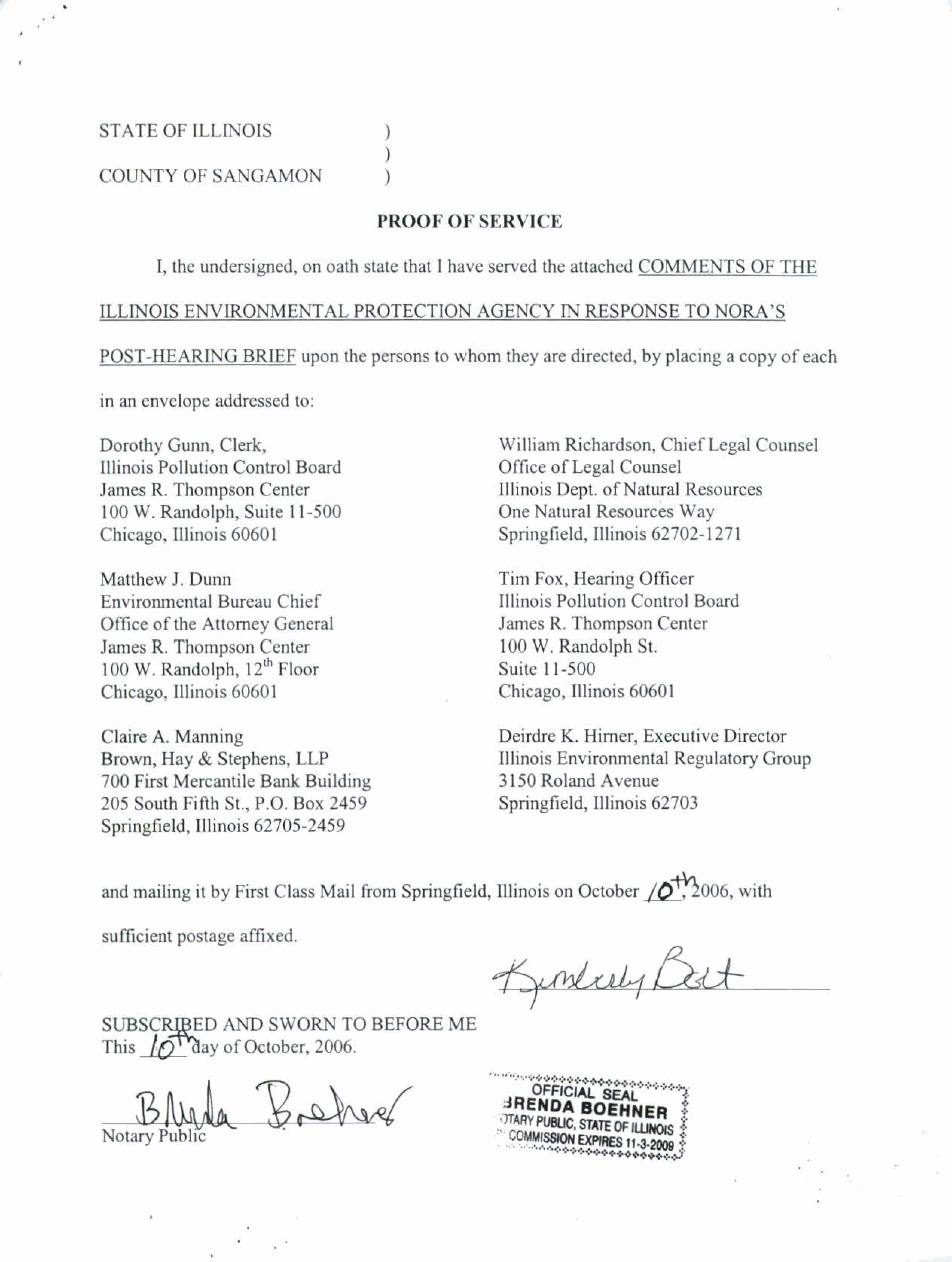| | - BEFORE THE ILLINOIS POLLUTION CONTROL BOARD
- PROPOSED AMENDMENTS TO THE BOARD'S SPECIAL WASTE
- REGULATIONS CONCERNING USED OK, 35 ILL. ADM. CODE 808,809
- William Richardson, Chief Legal Counsel Office of Legal Counsel
- Suite 11-500
- Chicago, Illinois 60601
- Springfield, Illinois 62703
- ILLINOIS ENVIRONMENTAL PROTECTION AGENCY
- Assistant Counsel Division of Legal Counsel
- BEFORE THE ILLINOIS POLLUTION CONTROL BOARD
- RO6-20
- on September 1,2006.
- 1. FEDERAL AND STATE REGULATIONS
- See aIso 57 FR 41569 dated September 10,1992 whicb states that,
- waste.
- 2. EFFECT OF THE EXEMPTION ON RECYCLING
- streams separate for appropriate management and recycling.
- inappropriately.
- their post-hearing brief, NORA has cited "McCoy's RCRA Unraveled" to provide
- book includes the following discliiiaeti:
- not be considered in the Board's decision regarding this rulemaking.
- 3. NEED TO LIMIT THE EXEMPTION
- also do not solely rely on the USDOT shipping paper for their own. records.
- issue before the Board.
- 4. INCENTIVE FOR MIXING AND THE DEMISE OF THE SPECIAL WASTE
- PROGRGM
- and relabel the mixture as 'used oil'.
- experience with such practices in this industry.
- will be managed by a used oil handler.
- regulations.
- and of the permitbng requirements in Section 21 (d) of the Act.
- used oil.
- the manifest exemption and hauling permit exemption.
- Respectfully submitted,
- STATE OF ILLINOIS
- C0rn'l-Y OF SANGAMON
- PROOF OF SERVICE
- ILLINOIS ENVIRONMENTAL PROTECTION AGENCY TN RESPONSE TO NORG'S
- Matthew J. Dunn
- William Richardson, Chief Legal Counsel Office of Legal CowwI
|
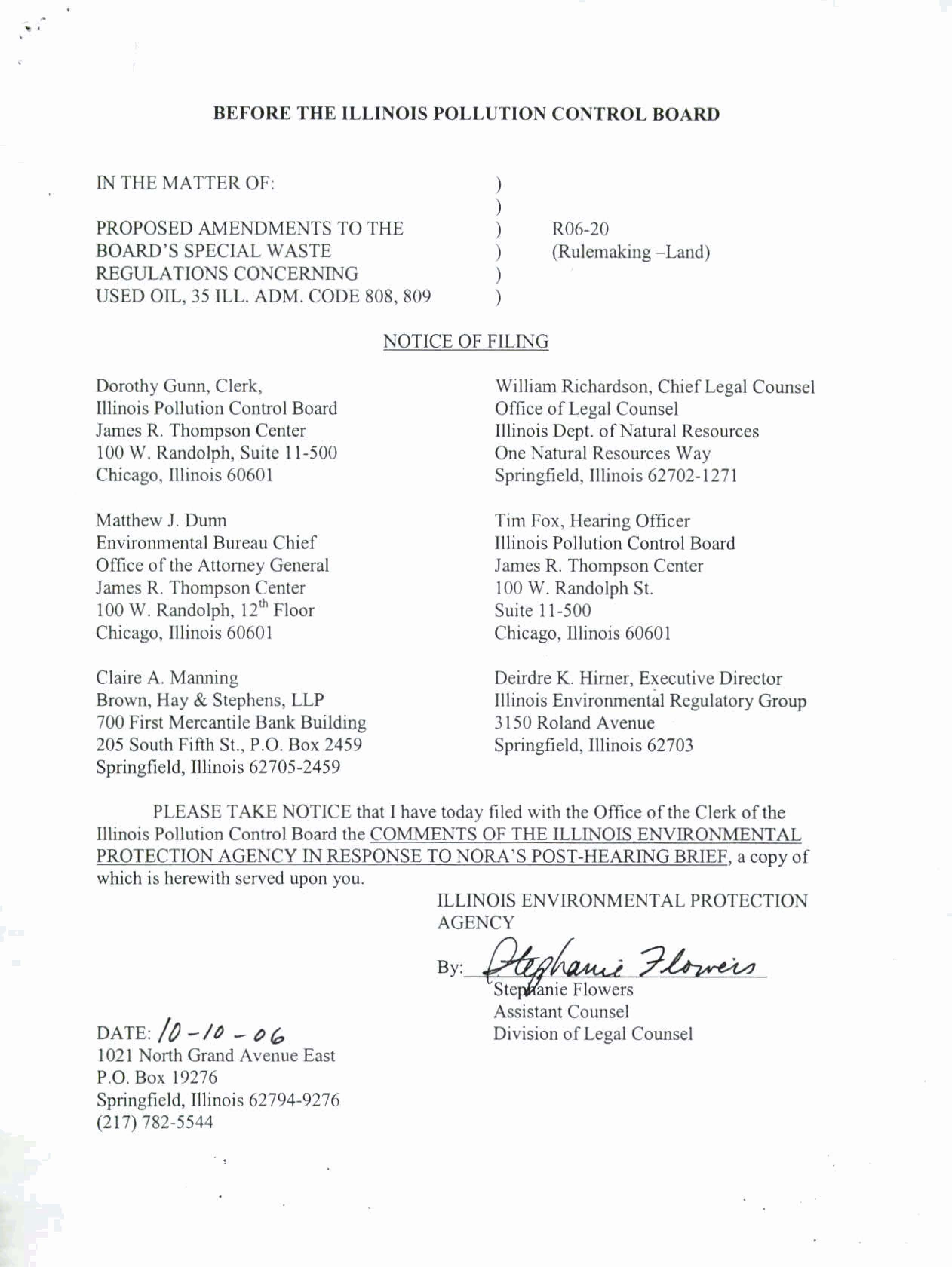
BEFORE THE ILLINOIS POLLUTION
CONTROL
BOARD
IN
THE MATTER
OF:
PROPOSED AMENDMENTS
TO THE
BOARD'S SPECIAL WASTE
REGULATIONS CONCERNING
USED
OK, 35
ILL. ADM.
CODE 808,809
NOTICE
OF
FLING
Dorothy
Gunn,
Clerk,
Illinois Pollution Control Board
James
R. Thompson Center
100
W. Randolph, Suite 1
1-500
Chicago,
Illinois 60601
Matthew
J.
Dunn
Environmental Bureau Chief
Oflice
of the Attorney General
James
R.
Thompson Center
100
W. Randolph,
1
2" Floor
Chicago, Illinois 6060 1
Claire
A.
Manning
Brown, Hay
&
Stephens,
LLP
700
First Memmtile Bank Building
205 South
Fifth
St.,
P.O.
Box
2459
Springfield, Illinois
62705-245
9
William Richardson, Chief Legal Counsel
Office of Legal Counsel
Illinois Dept. of Natural Resources
One
Natural Resources Way
Sprin&eld, Illinois
62702-
1271
Tim
Fox,
Hearing Officer
IIiizkois
Pollution Control Board
James
R.
Thompson Center
100 W. Randolph St.
Suite 11-500
Chicago,
Illinois 60601
Deirdre
K.
Himer, Executive Director
Illinois ~nvironmentd Regulatory Group
3 1 50 bland Avenue
Springfield, Illinois 62703
PLEASE TAKE NOTICE that I have
today
filed with the Office of the Clerk of the
Lllinois Pollution Control Board the COMMENTS
OF
THE ILLINOIS
ENVIRONMENTAL
PROTECTION AGENCY
IN
RESPONSE
TO
NOM'S POST-HEARING BRIEF,
a copy
of
which is
herewith
served
upon
you.
DATE:
/,
-16
-
06
1 02 1
North Grand
Avenue
East
P.O.
Box
19276
Sprinfleld, Illinois
62794-9276
(217) 782-5544
ILLINOIS ENVIRONMENTAL PROTECTION
AGENCY
By:
Assistant Counsel
Division of Legal Counsel
ELECTRONIC FILING, RECEIVED, CLERK'S OFFICE, OCTOBER 10, 2006
* * * * * PC #40 * * * * *
BEFORE THE
ILLINOIS POLLUTION
CONTROL
BOARD
IN
THE
MATTER
OF:
PROPOSED AMENDaNTS
TO
BOARD'S SPECIAL WASTE
REGULATIONS CONCERNING
USED
OIL,
35
ILL. ADM. CODE 808,809
RO6-20
(Rulemaking
-Land)
COMMENTS
OF THE
ILLINOIS ENVIRQNMENTAL PROTECTION
AGENCY IN
RESPONSE TO NORA'S POST-HEARING BRIEF
NOW
COMES
the
Illinois EnvjronpentaJ
Protection
Agency
("IllinoJs
EFA"),
by
and
through one of its
attorneys,
Stephanie Flowers,
and
respectfully submits the following
Comments
in
response
to
the Post-Hearing Brief filed with the Illinois Pollution Control Board
("Board")
by
the Association
of
ResponsibIe
Recyclers ('WORA")
in
the
abave-entitied matter
on
September
1,2006.
1.
FEDERAL AND STATE REGULATIONS
Throughout its post-hearing brief,
YOU
argues
@at
the,
main purpose of
the
federal
regulations was
to
promote the recycling of used oil. However,
a review
of
50
FR
49213,
November
29,1985,
(Part
One.1,A)
and
57
Fk
41566,
September
10,1992,
(II.Background)
clarifies
the true
goals
of
the
federal
used
oil regulations. These documents indicate that the
goal
of the federd regulations
is
to
provide management standards
for
used
oil and for materials
contaminated
with
used
ail and
that
protection
of
human health and
the
environment
from
the
hazards
of
used
oil is
the
prime conc,q
even
If
it
discourages recycling of this material.
NORA
also
argues that the federal regulations
at 40
CFR
279,
took
used
oil
out
of the
ELECTRONIC FILING, RECEIVED, CLERK'S OFFICE, OCTOBER 10, 2006
* * * * * PC #40 * * * * *
another
fedd
identical-in-substance
rulemakmg, ddes
that
used
ail still maeb
the
definition
of solid waste, but has its
om
management standards
as
a
recyclable material.
See 35
Ill.
Adm.
Code
72
1.1
M(a)(4), which
gtates
that,
"Used
oil that
is
recycled
and
is
also
a kuzurhus
waste
solely
because
it
exhibits
a
hazardow characte~tic
is
nor subject
to
the
requiremenk
of
35
dl. Adm
Code 720
through
728,
bu~
it b
regulated under
35
Ill. Adm.
Code 739,"
NO=
awes
that
the
federal regulations "entitle" all
non-hazardous
wastes
contamhated with some
d
oil
to
be
effkctively exempt
hm
Illinois' special waste
requirements and
only
xegulated
by
Part
739.
However,
the
Illinois EPA interprets the federal
regulations
as
requiring noa-hazaxdous
waste mixed
with
used
oiI
to
meet
the
management
standards
in
Part
739
but not pmpting more stringent
state
regulation
of
these wastes.
See
aIso 57
FR
21528
dated May
20,1992
which
states that,
'*[USEPA] ulso r-gnizes that
several
states
regulate used oil
as
o
hazardom
wmte, and
some
states
regslhte
it
as
a
special
wmte
. . .
A
wed
oil handler must comply with all
state requirements
appliable
to used
oil in hidher
state, in addition to
anyfideral requirements
that apply.
"
See aIso 57
FR
41569 dated
September
10,1992
whicb
states
that,
"The
WSEPA]
hm
deciakd
that these anent regulationr are
protective
bui
not complete or sttcient
to
prutect human health
ond the envirorrment
Pam
potential
rnismanagemmt
of
wed
ails
that are recycled.
*'
Matexid con-4
with
wed oil is
not
"entitlsd"
to
be managed under less stringent
regulation. Under
the
fsdd
program materials
that
were previously
unregulated,
were now
regulated if
contamhated
with
used
oil. Therefore,
in
the
federal prograxll
then
is
an
incentive
not
to mix
nan-hazardous
waste
that
is
unregulated with
used
oil
that
is regulated.
In
contrast,
NORA'S proposal would provide the opposite incentive and would
encourage mixtures
of used
ELECTRONIC FILING, RECEIVED, CLERK'S OFFICE, OCTOBER 10, 2006
* * * * * PC #40 * * * * *
ail
and
other special
wastes
to
take
advantage of the
reduced siting, operating and permitting
requirements
of used oil facilities compared to other special
waste
facilities. The Illinois EPA
believes that NORA'S proposal
is
a
relaxation of the Illinois regulatory requirements for special
waste.
2.
EFFECT OF THE EXEMPTION
ON
RECYCLING
In its post-hearing brief,
NORA
argues
that
there is no distinction
between
used oil
as
defmed
at
Section
739.100
and
materials regulated
as
used
oil
at
Section
739.1 10.
However,
USEPA carefully crafted the definition of used oil at 739.100 to include
all
oils that
were
used as
lubricants
md
have
been contaminated as a result of that use.
The
definition also attempted to
discourage adulteration after use. See
57
FR
4 1 574
dated September 10, 1992 which
states
that,
"Used
oils that become adulterated
after
me
should be subject
to
management
standards
that discourage
this
practice.
"
In
contrast
to
the
statement
above, the Illinois EPA believes NORA'S proposal
mmuri~ges the mixing
of other
wastes
into
used oil
by
offfering
a
manifest
exemption for
the
mixture.
But limiting
the
manifest exemption
to
used
oil
as
defined and
managed
in
accordance
with Part
739.100, as
the
Illinois EPA has proposed, encourages
the
generator
to
keep waste
streams
separate for appropriate management and recycling.
NORA
argues
that,
"the
key
here
is that material regulated under Part 739 is not regulated
as
waste,
but properly recyclable material". However,
the
Illinois EPA believes it is probable
r .
that
other waste
added into the
ussd
oil
mixture
(e.g.
inks,
solvents
and
coolants) will not be
myc1ed, but
will
be burned
with
the
usd
oil or
treatd
in
a waste
water treatment unit. Some of
the
wastes
added
to
used
oil which will be blended for fuel
do
not have fuel value themselves
p-~
and
may contain constituents that are
not
appropriate
to
bum
in
that setting.
ELECTRONIC FILING, RECEIVED, CLERK'S OFFICE, OCTOBER 10, 2006
* * * * * PC #40 * * * * *
Also
NORA
wgws that "the
Apcy's position is
. . .
inconsistent with
. . .
federal laws
that
allow specific
mixtures to
be managed
as
used oil." However,
although
the mixtures of used
oil and
other
non-hazardous special
waste
are subject
to
the
used
oil management standards
at
Part 739, once the free flowing oil is removed,
the
other waste
is
ao
longer subject
to these
standards. Therefore, the Nimis EPA believes
the
mixtures should
remain
subject
to
the special
waste
rnanifes~ or else
these
other
wastes
will
become
unregulated,
which is what
occurs
in
the
fed& program. Illinois has chosen
to
regulate non-hamdous special
waste
and therefore
the
continued
use
of
a
special waste manifest is necessary
to
adequately track the other
special
waste,
ta
alert bumers thab the
used
oil contains
ather
special
waste,
and
to
provide the record
necessary
to determine
whether
the
other specid waste
was
handled, managed or burned
inappropriately.
Other
non-hazardous special
wastes
should be evaluated separate1
y
to
determine if
they
sh9uld be exempted
hm
hauling permits and manifests, and
should
not be
exempt
merely
became
?he waste was
mixed
with
used
oil. Materials added
to the
used oil
after
generation
&~uld only be exempted
from
the manifest
and hauling requirements if
they
meet
the
criteria
in
Sections
809.2
10,809.21 1,
or Section
858.12 1.
The
pqose of regulating
other
materids
as
used
oil under Section
739.1 10
is
not
to
allow
these
other wastes
to
be classified
as
wed
oil. The purpose is
to
encourage
separation of
used
oil
md
other
wastes
and
to allow
less
fed~ral regulation
of
non-hazardous solid waste once
it
was
separated
born
used
oil.
See 57
FR
41581 dated
September
10,1992
which
states
that,
"PSEPA]
encourages
the spmtion
of
used oils fiom wed
oiUsolid
waste
mixiura
andfrom
used
oil-cuntamirutted matmials
prior to
munagment
of
the
mixture.
Used
oils sepmatedfrnrn
mixtures containing
other solid
wastes
should be recycled
in
accordance with
140
CFR
2791."
ELECTRONIC FILING, RECEIVED, CLERK'S OFFICE, OCTOBER 10, 2006
* * * * * PC #40 * * * * *
In
their post-hearing brief, NORA has cited "McCoy's
RCRA
Unraveled"
to
provide
''idhution concerning what mateials
are
subject
to
regulation
as
used oil", However, this
book includes the following discliiiaeti:
"This
guidance
manual addresses problems
of
a general
nature
related
to
the
federal
RCRA
regulations. Persons evaluating
spec
flc
circumstances
dealing with the RCRA rep
fations should
review
state
and local laws and regulations, which may be more
stringent than federal requirements.
In
addition,
a
quul
fied
professional
should be
enlisted to
address any site-spec$%
circumstancar.
"
As
acknowledged in
the text
of this
book,
'McCoy's
RCRA
Unraveled" is not
to
be
considered regulations themselves, but merely the author's interpretation of the regulations.
Therefore,
the
Illinois EPA believes
this
document and
NORA'S testimony regarding it should
not be
considered
in
the Board's decision regarding
this
rulemaking.
In
sum,
the
Illinois EPA believ$rs
that by
indirectly
encouraging mixtures of used oil
with
special
waste,
NORA'S proposal would have
a
negative impact
on
the ability
to
recycle each
waste stream
and
that
without
the
tracking of
individual
waste
streams
in mixtures,
the
wastes
may
be
inappropriately handled, managed or
burned.
3.
NEED
TO
LIMIT THE
EXEMPTION
In
its post-hearing brief, NORA argues that it
is
seeking
to
"eliminate
the
burdens
associated
with manifesting of
used
oil."
The Illinois EPA
can
understand that appropriate
paperwork is time consuming. However,
the
Illinois EPA believes that the
use
of
a
manifest is
necm for
wastes
that do
not
meet the definition
of used
oil because
the
used
ail tracking
system
will only identify the
waste
as used oil and will not require the generator
to
have
a
record
of the transportation and disposal of
the
non-hazardous special waste mixed with used oil.
ELECTRONIC FILING, RECEIVED, CLERK'S OFFICE, OCTOBER 10, 2006
* * * * * PC #40 * * * * *
USDQT shipping papers for non-hazardous materials will provide lit tie additional information.
The used oil tracking system
will
lead
the
transporter, emergency responders and receiving
facilities
to
believe
that
the waste
41
behave Iike
used
oil.
NOW
argues
that "manifesting requirements
. , .
are a waste
of
time,
paper, and
money.
Moreover,
they
are redundant with federaily
required
tracking documents."
As
stated above,
proper paperwork is always
time
consuming.
Hawevm,
there should be
no
double tracking
because
a mixture
of used oil and
other
special waste
does
not have
to
be documented twice.
The Part
809
manifest will also
satisfy the
Part
739
tracking
requirement.
The
Illinois EPA
does
not
believe that
the
federally required USDOT shipping papers provide enough information for
tracking of non-hazardous special waste. However,
by
their own testimony,
NORA
members
also do not solely rely
on
the
USDOT shipping paper for their
own.
records.
NOM
argues
that "company tracking
documents were
put
in
evidence in this proceeding
and
bear
sinilar,
if not
identical, resemblance
to
hois
manifesting
documents."
Although
this
statement
may
be
truthful,
these
business records
are
not required
by
Part
739
and not all
industry businesses will keep
such
thorough records unless it is required.
The
business records
submittad
in
evidence
go
beyond
the
minimum regulatory requirements
for
Part 739
used
ail
twlcing. Therefore,
the
IUinok
EPA
believes
that
ifNORA members
keep
manifest-like records
for their business, it should not be burdensome
for
the company
to
fjll
out a
Part
809
maslifest.
Since NOM's argument is not
sound,
the Illinois EPA believes
that
there
is
another reason for
NORA'S
pursuit of
a
manifest exemption for
mixtures.
The Illinois EPA believes
the
rd
reason
for NORA'S pursuit of
a
manifest exemption for
mixtures
of used
oil and other special waste is
so
that
the
other
special
waste that
usually
must
go to a
permitted
and
sited special
waste
facility
ELECTRONIC FILING, RECEIVED, CLERK'S OFFICE, OCTOBER 10, 2006
* * * * * PC #40 * * * * *
may
be hidden in the used oil and sent to an unpermitted, unsited used oil facility to be
NORA argues that
'7he
Illinois approach to used oil
. . .
is
inequitable"
and
that "the
Uhois situation
is
unusual
in
that
it
designates used
oil
as a
special
waste."
However, this
is
not
accurate.
Illinois
is
not
the
only
state
that designates used oil as a special waste and is not
the
only
state
that
uses a
manifest fbr mixtures of used oil and other special
waste.
Used oil
regulations vary
fiom
state
to
state
and while
some
states
only
require compliance with the
federal regulations, others
require
hauling permits, manifests, and other tracking papers for
mixtures of used oil and other non-hazardous special
waste.
Furthermore, it is the understanding
of the Illinois EPA that the exemption of used oil from
the
dehition of special waste
is
not
the
issue before the Board.
NORA
also
argues that
the
Illinois EPA proposal is inconsistent with the encouragement
of recycling and
states,
"the
Agency's
position virtually negates the intended positive impact of
NORA'S proposal."
This
statement is also inaccurate. The special
waste
regulations have been
in
place for
years
and, throughout this
time,
facilities have been recycling used oil and used oil
mixtures
in
Illinois. Furthennore, currently both outsf-state and
in-state
used oil trafisportas
must
use
manifests
and obtain
a
hauling permit
to
transport special
waste,
including used oil,
in
Illinois. The Illinois EPA proposal will allow haulers of used oil not containing
other
special
waste
to be
exempt
from
the
hauling permit and manifest requirement
and
therefore will
encourage
the out-of-state competitors to recycle used
oil
at
Illinois facilities. If
this
is
not
the
positive impact intended,
the
IIlinois EP A must question the
hue
intent of NORA'S proposal.
ELECTRONIC FILING, RECEIVED, CLERK'S OFFICE, OCTOBER 10, 2006
* * * * * PC #40 * * * * *
4.
INCENTIVE FOR MIXING AND
THE
DEMISE OF
THE
SPECIAL WASTE
PROGRGM
The
Illinois
EPA
believes that should NORA'S
proposal be adopted
by
the Board, the
11Linois EPA will lose regulatory control over non-hazardous specid waste and the special
waste
regulations
at
Part
808
and Part
809
will
be
effectively eliminated. NORA'S proposal will alIow
all non-hazardous special
waste mixtures to
be relabeled 'used
oil' and be managed soIel
y
under
the Part
739
regulations because the proposal does
not
specify
a
dmum
quantity
of
used
oil
that needs
to
be added
to the
waste mixture.
before
the
'&xture may be
relabeled
'used
oil'.
AAm
the
mixture
is
relabeled
in
kackhg
documrnts as
only
'used oil', the
mixture
may
be
received
by used
oil
facilities
that
have
Iess
stringent
permitting
and
siting requirements than
special
waste
facilities.
The Illinois
EPA
believes that the
less
stringent
permitting, siting, and
recordkeeping requirements for used oil facilitiw will be an incentive for facilities
to
combine
used
oil with o&er specid
waste
and
relabel the
mixture as
'used
oil'.
In
its post-hearing brief,
NORA
refers
to other waste
subject
to
regulation under
Part
739
as
Wed
oiI like substances".
NORA proposes
that the
Illinois EPA should not be concerned with
used oil like substances
as
long
as they
are baing managed
by used
oil handlers.
NORA
implies
that the
waste will always have valuable amounts of recyclable oil
and
therefore will be managed
properly, However, although
this
may be
true
for high grade
used
oil products, the Illinois EPA
knows
that
mauy
fdties
also
profit
by
collecting generator fees and dipsing
of
the mixtures
as
low grade
used
oil fuel.
The
Illinois EPA believes
that
many of these facilities
will
abuse
the
used
oil manifest exemption
to receive
special waste that must normally
be
managed
at a
facility
&at
bas
siting and has been
mttd
to
manage special
waste.
The
Illinois EPA
has
already
had
experience with such practices in this industry.
ELECTRONIC FILING, RECEIVED, CLERK'S OFFICE, OCTOBER 10, 2006
* * * * * PC #40 * * * * *
NORA
describes,
in
its post-hearing
brief, its members' commitment
to
guiding
principles.
Although the Illinois EPA commends NORA for its
good
business practices, these
guiding
principles are
not followed
by
all companies
in
the
industry and
are
not
enforceable by
the Illinois EPA in its duty
to
protect human health and the environment. Therefore the Hhis
EPA believes that should NORA'S
proposd be adopted
by
the
Board, abuse of the exem'ptbn
will occur. Enforcement against
facilities
that
accept
waste containing small
amounts
of
used
oil
would
be
dificdt, since under NORA'S proposal there
is
no
minimum amount of
useJ
oil
specified
that
must
be added to the
waste
mixture before it
may
be relabeled
as
used
oil.
As
indicated
in
previous testimony,
used
oil handlers also manage
waste
such as
plastic
pellets, carbon filter media, adactants, water based paint,
water
based
ink,
emulsion solutions,
grd&aterIoil
mixme,
cleaaing
cotilpdimd, sludge, wash water, super abrasive,
sand,
tank
sludge, water based coolants, and barge bilge
water.
These
wastes
should not receive
a
manifest
exemption and
the
receiving facility should
not
be exempt from permits and siting because
a
few
drops
of ail were added
to
these wastes
after
generation.
NORA
has not proposed
any
way
to
distinguish when the
waste
is
used
oil that will be recycled and when
the
waste
will be mainly
non-hazardous
special waste containing small
amounts
of used oil,
except
to say that the waste
will be managed
by
a
used oil handler.
NORA argues that
the
"Agency's position
is
contrary
to
the
stattisijuo"
and that
"NOIUI's language does not change the
way
the used oil industry
does
business, nor
does
it seek
to
change
what
is
or
is
not entitled
to
be
treated as wed
oil
pursuant
to
current regulations."
However, the special
waste
manifesting
and
hauling regulations
already
exist and
already
apply
to wed
oil. The Illinois EPA is not seeking
a
new category of
waste
or new interpretation of Part
ELECTRONIC FILING, RECEIVED, CLERK'S OFFICE, OCTOBER 10, 2006
* * * * * PC #40 * * * * *
waste
manifest exemption in Part
809
to
used
oil
as
defined and managed in accordance with
Part
739.1
00.
This
does
not
mean
U
the
used
oil mixtures that
NORA
said are currently being
picked
up for
recycling
would no longer be recycled. It
only
means that
these
mixtures would
still
have
to
be transported
der
a
manifest.
In
addition, the Ulinois EPA
'
s
proposed wording
would not change
the
regulatory
status
of
wash
cmtly
exempt
hm
manifesting under other
regulations.
NORA has argued
that
'ho
real evidence was
presented
regarding any danger with the
cm
program" and the "Agency
has
the
ability
to enforce
against any
of
those companies who
are not complying with Part
739."
The
Illinois EPA believes
NORA
has mischardzed
the
Illinois EPA" concerns
as
a
failure
to
enforce existing special
waste
regulations. However,
tke
Illinois EPA's real concern
is
that
the
memption
as
proposed
by
NORA
is
not
adequate to
insure
that important information about the
waste
is
conveyed
to
the receiving
facility,
waste
handlers,
emergency responders
and
ttre
Illinois EPA. According
to
NORA'S proposal the addition of
smdI
amounts
of
wed
oil
to other
waste would allow
the other
waste
to go
without
a
manifest or
any
identification
to
an
unsited,
unpermitted
facility
that
is
only
registered
to accept
used
oil.
The Illinois EPA believes this is
inconsistent
with
the
cradle-to-grave tracking of special
waste
required
in
the
current
special waste regulations. The Illinois EPA
is
concerned
that
since there
is
no
minimum amount of
used
oil
that
rnwt
bo
dded
to
a waste
to make
it
subject
to Part 73 9,
NORA'S proposed exemption would
result
in
abuse of the manifest system and
also
of the local
siting approval
requirements
in
Section
39.2
of
the
Illinois
Environmental Protection
Act C'Act")
and
of
the
permitbng requirements
in
Section
21 (d) of the Act.
The
Illinois EPA quests
that
the
Board
hd
that
Section
739.1 10 does not
allow a
person
to
avoid
the
solid
waste
permit requirements of Section 2
1
(dl of the Act and the local
ELECTRONIC FILING, RECEIVED, CLERK'S OFFICE, OCTOBER 10, 2006
* * * * * PC #40 * * * * *
siting requirements
of
Section 39.2
of
the
Act
by
intentionally contaminating
solid waste with
used oil.
The
Illinois EPA also requests that the Board, for the reasons
stated above,
adopt the
alternate
language
as
provided by the Illinois EPA
in
its
comments
and testimony
to
accomplish
the
manifest exemption and hauling permit exemption.
Respectfully submitted,
ILLINOIS ENVIRONMENTAL
PROTECTlON
AGENCY
By:
~6hanie
Flowers
3-
Assistant Counsel
Division of Legal
Counsel
DATED:
/h
0 -
fl
b
102 1
North Grand
Avenue
East
P.O. Box
19276
Springfield, lllinois
62794-9276
(2 17) 782-5 544
ELECTRONIC FILING, RECEIVED, CLERK'S OFFICE, OCTOBER 10, 2006
* * * * * PC #40 * * * * *
STATE OF ILLINOIS
C0rn'l-Y
OF
SANGAMON
PROOF
OF
SERVICE
I,
the undersigned,
on
oath state that
I
have
served
the attacbed COMMENTS
OF THE
ILLINOIS ENVIRONMENTAL PROTECTION AGENCY
TN
RESPONSE
TO
NORG'S
POST-HEARING BR?EF
upon
the persons
to
whom
they
are
directed, by
placing
a
copy
of
each
in
an
envelope
addressed
to:
Dorothy
Gum,
Clerk,
Illinois Pollution Control Board
James
R.
Thompson Center
I00
W.
Randolph,
Suite 11-500
Chicago, IIIinois
6060 t
Matthew J. Dunn
Environmental Bureau Chief
Ofice of
the
Attorney General
James
R.
Thompson
Center
100
W.
Randolph,
1
2" Floor
Chicago, Illinois
60601
Claire
A.
Manning
Brown, Hay
&
Stephens,
LLP
700
First Mercantile Bank Building
205
South Fifth
St.,
P.O. Box
2459
Springfield, Itlinois
62705-2459
William Richardson, Chief Legal Counsel
Office of Legal CowwI
Illinois Dept.
of
Natural Resources
One
Natural ~emurc& Way
Springfxeld, Illinois
62702-
1 27 1
Tim
Fox, Hearing Officer
Illinois Pollution Control Board
James
R
Thompson Center
1
00
W.
Randolph
St.
Suite
1 1-500
Chicago, IUinois 60601
Deirdre K.
her, Executive Director
Illinois Environmental Regulatory
Group
3
1
50 Roland Avenue
SpringField,
Illinois
62703
and mailing it by First Class Mail
from
Springfield, Illinois
on
October
/&006,
with
sufficient postage
eed.
ELECTRONIC FILING, RECEIVED, CLERK'S OFFICE, OCTOBER 10, 2006
* * * * * PC #40 * * * * *


